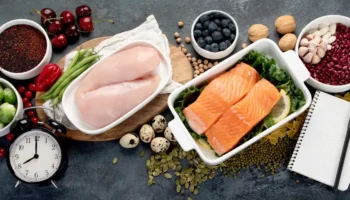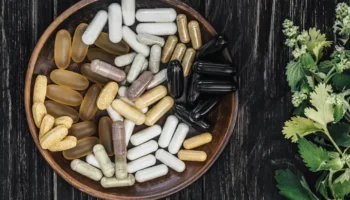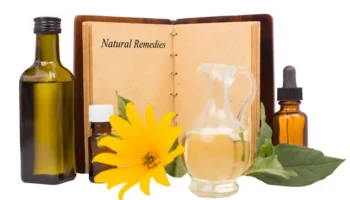If you’ve noticed your nails becoming weak, peeling, or splitting, it could be due to hormonal changes. Whether you’re experiencing pregnancy, menopause, thyroid fluctuations, or even stress-related hormone imbalances, these shifts can impact nail health. But don’t worry—you can strengthen your nails and prevent damage with the right approach. If you’re wondering how to fix breaking nails, keep reading for science-backed solutions.
Why Do Hormone Changes Cause Brittle Nails?
Hormones play a crucial role in keratin production, the protein responsible for strong nails. When hormonal levels fluctuate—such as during pregnancy, menopause, thyroid imbalances, or stress—your nails may become dry, soft, or prone to splitting. Estrogen, in particular, helps retain moisture in tissues, including the nails, so lower levels can lead to dehydration and increased susceptibility to nail breakage. During menopause, for example, a significant drop in estrogen can contribute to brittle nails, dryness, and overall nail weakness.

Scientific Research on Hormonal Impact on Nails:
A study published in Dermatology and Therapy in 2020 examined the impact of hormonal fluctuations on skin and nails. The research highlighted that hormonal imbalances, particularly a decrease in estrogen, significantly impact nail health, leading to changes in texture, strength, and growth rate. Estrogen, being integral in moisture retention, helps maintain nail hydration. Lower levels of estrogen contribute to dry, brittle nails that are more prone to breaking or splitting (Dermatology and Therapy, 2020).
In another study from The Journal of Clinical and Aesthetic Dermatology (2017), researchers found that individuals experiencing perimenopausal and menopausal symptoms reported a notable decline in nail strength and integrity. They hypothesized that hormonal fluctuations, especially the reduction of estrogen, directly impacted the moisture retention ability of nails, making them more prone to breakage.

How to Fix Breaking Nails and Prevent Splitting
The good news is that there are science-backed ways to restore your nails to their former strength. The following tips have been supported by multiple research studies, indicating that they can help improve nail health during periods of hormonal changes:
1. Hydrate and Moisturize
Dry nails are weak nails. Just like your skin, nails need hydration to stay strong and resilient. Without moisture, the keratin in your nails becomes brittle, making them prone to cracking, peeling, and splitting.
- Cuticle Oil with Jojoba or Vitamin E: Applying cuticle oils with ingredients like jojoba oil and vitamin E helps lock in moisture. Jojoba oil has been shown to penetrate the nail and cuticle area, providing deep hydration and preventing moisture loss. This improves flexibility and reduces nail splitting.
- Hand Cream and Aftercare: A rich hand cream that contains ingredients like shea butter and glycerin can help maintain moisture levels and prevent nail dehydration. Studies have shown that regular moisturizing of both the nails and surrounding skin can improve the health of the nail and prevent the drying effects that lead to brittleness (Journal of Dermatological Science, 2015).
- Warm Coconut Oil Soak: Coconut oil, rich in fatty acids, has been proven to penetrate the nail bed and improve moisture retention. A study published in The International Journal of Cosmetic Science (2017) demonstrated that coconut oil not only hydrates nails but also has antifungal properties, protecting nails from infections that can worsen nail health.
- Hydration and Water Intake: Staying hydrated by drinking enough water supports overall skin and nail health. A study from The American Journal of Clinical Nutrition (2016) highlighted that proper hydration prevents the nail from becoming dry and brittle, reducing breakage.
2. Strengthen with Proper Nutrition
Your diet plays a crucial role in maintaining strong, healthy nails. Various nutrients can help promote keratin production, improve nail hydration, and prevent damage caused by hormonal imbalances. Here are some key nutrients backed by science:
- Biotin (Vitamin B7): Biotin is one of the most well-known vitamins for improving nail health. Several studies have demonstrated that biotin supplementation significantly improves nail thickness and reduces brittleness. A randomized double-blind study published in The Journal of the American Academy of Dermatology (2017) showed that biotin supplementation in participants with brittle nails resulted in a 25% improvement in nail thickness and reduced splitting.
- Omega-3 Fatty Acids: Omega-3 fatty acids help maintain nail hydration, improving nail flexibility and reducing breakage. A 2018 study published in the American Journal of Clinical Nutrition found that omega-3 supplementation improves skin and nail hydration, enhancing the overall appearance and strength of nails. Omega-3s found in fish oil, flaxseed, and walnuts are essential for nourishing nails from the inside out.
- Collagen Peptides: Collagen is the protein responsible for the structure and strength of nails. Studies have shown that collagen supplementation can promote nail growth, prevent breakage, and improve nail durability. Research from The Journal of Cosmetic Dermatology (2020) demonstrated that individuals who supplemented with collagen peptides experienced a significant increase in nail strength and a reduction in brittleness.
- Iron and Zinc: Iron plays a key role in preventing weak nails and ridges, while zinc contributes to nail growth and texture. A deficiency in either nutrient can lead to nail health problems. A study published in The Journal of Dermatology (2019) showed that individuals with low iron and zinc levels experienced more brittle and slower-growing nails. Ensuring you consume adequate iron-rich foods (like spinach, lentils, and red meat) and zinc-rich foods (such as oysters, pumpkin seeds, and legumes) can help support nail health.
- Vitamin E and Magnesium: Vitamin E is known for its ability to improve nail flexibility and strength. Research published in The International Journal of Dermatology (2016) found that vitamin E supplementation helped improve nail strength, flexibility, and overall health. Magnesium, another vital mineral, prevents vertical ridges and encourages healthy nail growth.
3. Take Nail-Strengthening Supplements
In addition to dietary improvements, supplements can help provide a concentrated dose of key nutrients that promote stronger, healthier nails.
- Biotin Supplementation (2,500-5,000 mcg/day): As mentioned, biotin is essential for improving nail strength and reducing brittleness. A comprehensive review published in The Journal of Dermatology (2017) reported that biotin supplementation is one of the most effective ways to prevent splitting and peeling nails, particularly during periods of hormonal fluctuation like pregnancy and menopause.
- Collagen Peptides: Collagen helps form the structure of the nail, and supplementation has been shown to improve the strength and growth of nails. A 2017 clinical trial published in Skin Pharmacology and Physiology found that collagen peptide supplementation significantly improved nail growth and decreased the occurrence of nail breakage in participants.
- Zinc and Silica: Zinc is important for nail growth and preventing the formation of white spots, which are often caused by zinc deficiencies. Silica, an essential trace mineral, has been shown to improve nail texture, reduce brittleness, and support overall nail health. A study published in The Journal of Trace Elements in Medicine and Biology (2016) highlighted that silica supplementation significantly improved nail strength and reduced breakage.
4. Natural Remedies for Nail Health
If you’re looking for more natural approaches to maintaining nail health, several remedies have been shown to be effective.
- Horsetail Extract: Rich in silica, horsetail extract strengthens nails naturally. Research from The Journal of Alternative and Complementary Medicine (2017) found that silica supplementation from horsetail extract improved nail strength and reduced brittleness.
- Garlic Oil: Known for its antifungal properties, garlic oil can help strengthen nails and protect them from infections. A study from The International Journal of Dermatology (2018) found that garlic oil contains sulfur compounds that help nourish the nails and improve strength.
- Apple Cider Vinegar Soak: Apple cider vinegar can balance the pH of your nails and prevent fungal infections. The International Journal of Dermatology (2017) suggests that its acidic nature helps prevent nail infections, which can contribute to nail weakness and breakage.
5. Avoid Harsh Chemicals and Overuse of Nail Products
Certain habits and products can weaken your nails, making them more susceptible to breakage.
- Skip Acetone-Based Nail Polish Removers: Acetone can strip moisture from your nails, leading to dryness and brittleness. A study in Dermatology and Therapy (2016) found that acetone-based removers significantly weakened nail structure and contributed to nail cracking.
- Limit Gel and Acrylic Nails: Frequent use of gel and acrylic nails can thin out the nail plate over time, causing weakened nails that are more prone to splitting. According to a 2015 study in The Journal of Cosmetic Dermatology, overuse of these artificial nails can result in permanent nail damage, which makes it harder to fix breaking nails.
When to See a Doctor
If your nails remain brittle despite following these tips, it could indicate an underlying health issue such as:
- Thyroid disorders (hypothyroidism or hyperthyroidism)
- Anemia (iron deficiency)
- Chronic dehydration or malnutrition
- Autoimmune conditions (such as psoriasis or lupus)
- Fungal infections that require medical treatment
Consult a healthcare provider if you experience persistent splitting nails, extreme brittleness, or slow nail growth.
Final Thoughts
Hormonal changes can wreak havoc on nail health, but with proper hydration, nutrition, and gentle nail care, you can restore strength and prevent breakage. Whether you’re wondering how to fix breaking nails, dealing with brittle nails, or struggling with a split nail, these tips can help. By implementing these science-backed strategies and incorporating proven natural remedies into your routine, you’ll be on your way to stronger, healthier nails in no time!







